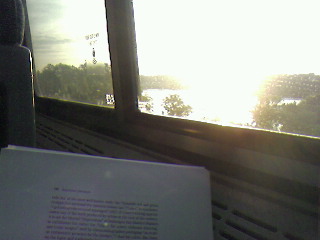 It’s summer and you’re heading out of town—or maybe you’re planning a trip to the far reaches of your very own backyard for an imaginary afternoon getaway. Either way, you’re going to want something to read. Traveling is so much more enjoyable when you’ve got a trusty book to share the journey with.
It’s summer and you’re heading out of town—or maybe you’re planning a trip to the far reaches of your very own backyard for an imaginary afternoon getaway. Either way, you’re going to want something to read. Traveling is so much more enjoyable when you’ve got a trusty book to share the journey with.
But what to bring? The night before your departure, as you’re packing your suitcase, it’s hard to come up with good reading ideas. So plan ahead with these suggestions tailored to the delights and perils of travel.
- Long nineteenth-century novels, believe it or not, are ideal for road trips, long flights, visits with distant relatives…any situation where extended periods of luxurious literary immersion are likely to be punctuated by interruptions. That’s because many of these novels were first published in periodicals in monthly installments. Publishers were looking for ways to encourage readers to buy the next issue, but you can benefit from the resulting narrative structure: there will be a cliff-hanger every chapter or two—and a helpful recap at the beginning of the next. Masterpieces of serialization include Uncle Tom’s Cabin and just about everything by Charles Dickens; the stop-start construction is not quite so obvious in the serialized works of Tolstoy, Flaubert, George Eliot and Henry James.
- Or maybe you like the idea of a one-day read, which can make you feel like you’ve packed an entire vacation into 24 hours. Some of my favorite short stories are by writers best known as novelists or playwrights or poets—Edith Wharton, Anton Chekhov, Virginia Woolf, William Faulkner, Langston Hughes, Kurt Vonnegut, Gabriel Garcia Marquez.
- Travel is always about adventure, essentially, and a love affair with the melancholy-wry adventure stories of Ernest Hemingway is practically a rite of passage for travelers to certain corners of the globe. If you’ve been there done that but still long to recapture the adventurous spirit of the early 1900s, what about Joseph Conrad, Franz Kafka, Katherine Mansfield, or Zora Neale Hurston?
- Graphic novels/comics/manga—yes. Ideal, IMHO, for camping, hiking and other outdoorsy pursuits that are likely to leave you tuckered out at the end of the day, aching for a good book but not up for dense lines of print. Select “advanced search” in Catalyst for subject terms “graphic novel OR comic book OR cartoonists” (no quotation marks) and you’ll get a long and tantalizing list. Too many options? Follow these expert recommendations if you prefer.
- Fiction by authors from outside the U.S. can connect you to the people and history of an unfamiliar place. “Contemporary world fiction,” so called, is a booming business now, and much of it is written in English or has been translated. The Commonwealth Foundation awards annual prizes for first books and short stories by writers from the fifty-four nations of the Commonwealth (most are former British colonies or dependencies); search for past winners on their website to find authors whose work you’d like to read, then search for those authors in Catalyst. The Commonwealth website also provides information about other international awards you can investigate in like manner.
- Driving and looking at a page or screen are incompatible activities, it turns out. But audio-books are eyes-free reading! If you’re an avid iTunes user or podcast junkie, you don’t need me to tell you that listening to books is an awesome way to road trip. The library’s collection of audio-books, which we used to call “books on tape” back in olden times, is mostly, um, books on tape. (Tape was this magnetized strip of plastic that … oh, never mind.) You can see what we have by searching in Catalyst’s “advanced search” for relevant keywords—“literature” for example (no quotation marks)—and limiting format to “non-musical sound recordings.” But for the love of Mike, sort your search by “year” (as opposed to “relevance”) to see holdings that are on cd rather than vinyl or tape. We have mostly concentrated our audio-books collecting in recent years on academic materials, because you folks have so many options now for downloading and listening to audio files. Lots of literary recordings in the public domain are now available for free at sites like librivox, booksshouldbefree, and audiobooks.
If these suggestions don’t float your boat, fly your plane or drive your train, no worries—check out our posts from earlier in the summer with ideas for relaxing and experimental reads. Bon voyage!
